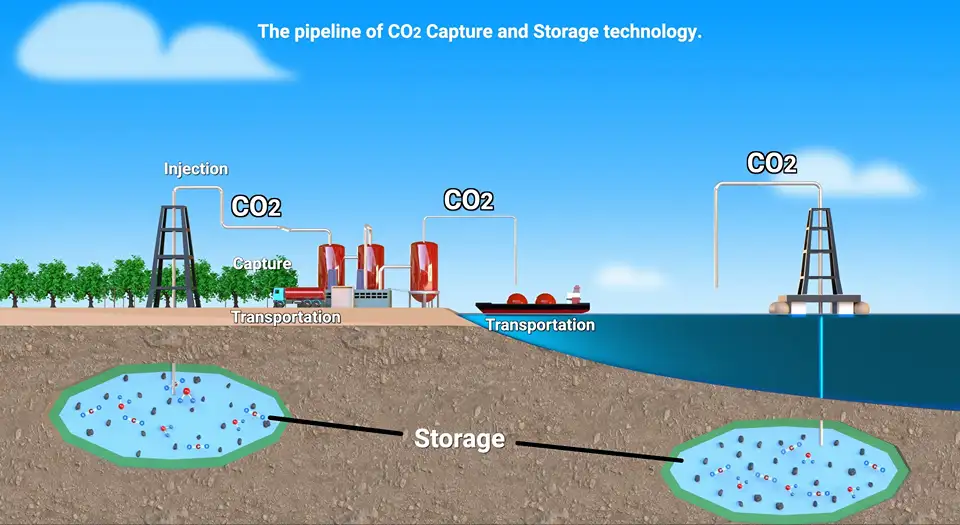- Introduction: Advancing Offshore Carbon Storage
- Project Overview: North Sea CO₂ Storage Initiative
- Dredging Operations by Boskalis
- Diving Operations and Subsea Preparation
- Offshore Support and Platform Work
- Environmental and Engineering Impact
- Conclusion: Boskalis’ Role in Offshore Energy Transition
Introduction: Advancing Offshore Carbon Storage
The transition to cleaner energy systems has brought new life to the North Sea, transforming former gas fields into sustainable CO₂ storage hubs. As part of this transformation, Boskalis has played a key role in developing vital offshore infrastructure that supports large-scale CO₂ storage. In partnership with Allseas, Boskalis undertook dredging and diving operations in the Maasgeul Channel, ensuring that the subsea pipeline network for CO₂ transport and storage was installed safely and efficiently.
Project Overview: North Sea CO₂ Storage Initiative
The North Sea CO₂ initiative focuses on repurposing existing offshore gas fields for long-term CO₂ storage, a critical step toward achieving regional carbon neutrality goals. As part of this initiative, Boskalis worked alongside Allseas to facilitate the installation of a 22-kilometer-long offshore pipeline. This pipeline will link onshore CO₂ collection points to offshore storage reservoirs beneath the seabed.
The Maasgeul Channel, a crucial shipping route near the Port of Rotterdam, served as a key location for the project. Its strategic position and high traffic density posed engineering and logistical challenges that required precision planning and execution by Boskalis’ dredging and diving teams.
Dredging Operations by Boskalis
To prepare the seabed for pipeline installation, Boskalis deployed two of its advanced dredgers: the trailing suction hopper dredger (TSHD) Gateway and the backhoe dredger Manu-Pekka. The main objective was to excavate a trench through the busy Maasgeul Channel, creating a stable, safe corridor for the subsea pipeline.
These dredging operations required careful coordination to minimize disruption to vessel traffic while maintaining precise depth and alignment tolerances. By leveraging real-time monitoring systems and advanced dredging technology, Boskalis ensured that trenching was completed efficiently and safely, laying the foundation for a critical step in offshore CO₂ storage infrastructure.
Diving Operations and Subsea Preparation
Beyond dredging, Boskalis’ Inshore & Nearshore Diving Services team executed complex subsea tasks under challenging conditions. Divers worked at depths of 17 meters in the fast-flowing waters of the Maasgeul Channel, preparing the seabed for the pipeline pull-in operations.
These operations involved connecting subsea equipment, installing temporary supports, and ensuring structural alignment before the pipeline was laid. The team’s expertise in working in low-visibility, high-current environments was vital to maintaining project timelines and safety standards.
Their precision and adaptability highlighted the integral role diving services play in enabling offshore CO₂ storage systems to function reliably in demanding marine environments.
Offshore Support and Platform Work
The offshore segment of the project included extensive subsea installation activities around the P18-A platform, an existing gas field now being repurposed for CO₂ storage. Boskalis divers, operating from Allseas’ pipe-laying vessel Lorelay, installed clamps and long spool pieces to secure the 16-inch riser to the platform foundation.
These operations combined engineering precision with hands-on subsea expertise, ensuring that the offshore infrastructure was ready to handle the high pressures associated with carbon transport and injection. The collaboration between Boskalis and Allseas exemplified how marine engineering and subsea construction expertise can converge to deliver world-class CO₂ storage solutions in the Maasgeul Channel and beyond.
Environmental and Engineering Impact
The Boskalis-Allseas collaboration demonstrates how existing offshore assets can be adapted for sustainable use. By converting depleted gas fields into storage reservoirs, projects like this significantly reduce atmospheric carbon emissions. The use of advanced dredging techniques and controlled diving operations ensured minimal ecological disturbance in the Maasgeul Channel, maintaining a balance between industrial activity and marine conservation.
Furthermore, this initiative underlines the engineering innovation required to support CO₂ storage infrastructure, an essential component of global decarbonization efforts. The precision of trenching and the accuracy of subsea installations reflect Boskalis’ commitment to operational excellence and environmental stewardship.
Conclusion: Boskalis’ Role in Offshore Energy Transition
Boskalis’ successful completion of dredging and diving operations in the Maasgeul Channel reinforces its leadership in offshore engineering and sustainability-driven marine solutions. Through its partnership with Allseas, Boskalis contributed directly to expanding the North Sea’s CO₂ storage capacity, turning a once gas-dependent region into a model for carbon management and energy transition.
As global demand for low-carbon infrastructure grows, Boskalis’ experience in complex subsea environments positions it as a key enabler of offshore CO₂ storage projects worldwide, supporting the path toward a more sustainable and resilient energy future.
